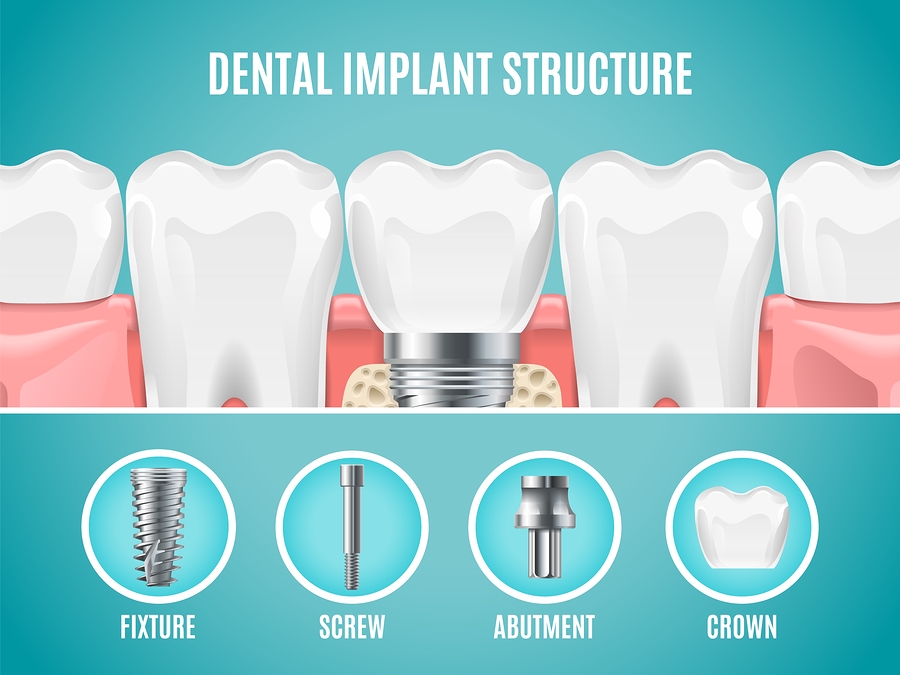The 8-Second Trick For Dental Sense
The 8-Second Trick For Dental Sense
Blog Article
Dental Sense for Beginners
Table of ContentsDental Sense for DummiesSome Known Details About Dental Sense Excitement About Dental SenseIndicators on Dental Sense You Should Know
are medical devices surgically implanted right into the jaw to restore a person's capacity to eat or their look. They supply support for man-made (phony) teeth, such as crowns, bridges, or dentures. When a tooth is lost due to injury or illness, a person can experience complications such as fast bone loss, malfunctioning speech, or adjustments to eating patterns that cause pain.Oral dental implant systems consist of a dental implant body and dental implant abutment and might additionally consist of an abutment fixation screw. Same day dental implants. The dental implant body is operatively inserted in the jawbone instead of the tooth's origin. The oral implant abutment is generally connected to the dental implant body by the joint fixation screw and prolongs through periodontals into the mouth to support the attached man-made teeth
(https://allmyfaves.com/dentalsense1?tab=Dental%20Sense)Framework of The Oral Implant System picking oral implants, speak with your oral service provider regarding the prospective benefits and risks, and whether you are a candidate for the treatment. Points to consider: Your general health is an important variable in determining whether you are an excellent candidate for dental implants, exactly how long it will certainly take to heal, and the length of time the implant might remain in area.
Cigarette smoking might affect the recovery procedure and decrease the long-term success of the dental implant. The recovery process for the implant body may take several months or longer, throughout which time you commonly have a short-lived joint instead of the tooth. the dental implant procedure: Thoroughly comply with the dental health guidelines offered to you by your oral copyright.
Not known Facts About Dental Sense
Implant failure can lead to the requirement for an additional surgical treatment to take care of or replace the dental implant system. Recovers the capacity to eat Brings back aesthetic look Aids maintain the jawbone from reducing because of bone loss Protects the wellness of the bordering bone and periodontals Aids keep adjacent (neighboring) teeth stable Boosts top quality of life Damages to surrounding natural teeth throughout implant placement Injury to the surrounding cells during surgical procedure, such as sinus perforation Injury during surgical procedure (for instance, fracture of surrounding jawbone) Poor function, such as feeling like the teeth do not attack with each other typically A feeling that the tooth is loose or twisting in location arising from an abutment screw loosening up Implant body failing (looseness of the implant body) due to systemic infection, which might be most likely in individuals with uncontrolled diabetes because of regional infection in bone and periodontals sustaining the implant body because of postponed healing, which may be more most likely in patients that smoke Trouble cleaning up the gums around the implant, causing poor oral hygiene Without treatment periodontal condition Post-surgical numbness as a result of nerve impingement or damages Constantly inform wellness treatment companies and imaging technicians that you have oral implants before any type of magnetic vibration imaging (MRI) or x-ray treatments.
FDA is not mindful of any type of damaging events reported for MRI or x-ray treatments with dental implants. Dental implants systems are generally constructed from products that follow worldwide consensus standards of the International Organization for Standardization (ISO) or ASTM International. These standards have information of what makes a safe material.

An oral implant is a framework that replaces a missing tooth. With screw-like devices, the doctor inserts an implant right into the jawbone, and it serves as a support for a man-made tooth, called a crown. A tool called an abutment connects the synthetic tooth to the oral implant. The crown is customized to fit the person's mouth and match the color of their teeth.
Dental Sense for Beginners
Some individuals are not qualified for dental implant surgery. It is for oral doctors to operate on individuals with: severe illnessuncontrollable metabolic diseasebone or soft cells condition or infectionIf these issues are solved, a person can have the surgical procedure. In, oral cosmetic surgeons refrain from running on people with: If individuals with any of the above go through dental implant surgical treatment, there is a greater danger of the dental implant falling short.

Dental implant surgical treatment is a personalized process. It's not the same for everyone. The following gives a general review of what you can anticipate your dental expert, oral surgeon, periodontist or prosthodontist to do: Put the dental implant operatively. Give you time to heal. Attach the post and last crown, bridge or denture.
Next, your doctor will meticulously position the dental implant right into your jaw. Lastly, your doctor will certainly rearrange your gums and shut the cut with stitches. If your dental implant is near the front of your mouth, your dental professional will make a short-lived tooth for you to wear until you recover. By doing this, you won't have a gap in your smile while you recoup.
Dental Sense Things To Know Before You Buy
Throughout the healing phase, your jawbone needs to fuse to the dental implant. This process can take anywhere from 3 to 9 months.
As soon as your dental implant heals, your dentist can affix the abutment (tiny adapter blog post) and your final reconstruction (crown, bridge or denture). This generally takes regarding one hour to finish and might need a 2nd minor surgery. You should not feel any kind of pain throughout your oral implant treatment since your supplier will certainly utilize medication to numb Website your periodontals.
Report this page